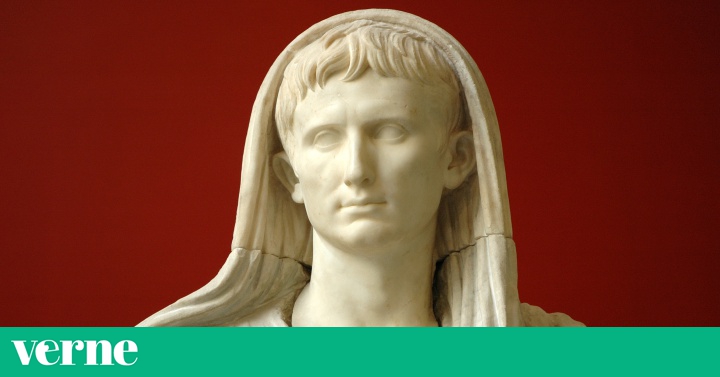We consider ourselves heirs, at least in part, of the Romans. They founded many of our cities, our language comes from Latin and even roads and highways have been built on ancient Roman roads. Although sometimes we also feel, fortunately, distant from many aspects of their culture, such as slavery, wars of conquest or gladiatorial fights. As the historian and popularizer Néstor F. Marqués reminds Verne , when we go to the concepts behind some of these cultural manifestations, we see that it is not so difficult to find parallels between many of their attitudes and ours. Is admiration for a charioteer different than we feel for a footballer?
We collect some of these activities and customs that may seem more or less modern, but which were already done, in their own way, by the Romans of the Republic and Empire. With a warning from the Marquis himself: do not fall into “presentism”. In other words, one thing is to compare and establish analogies to help us better understand the past (and our present) and quite another to “introduce our biases” to justify beliefs and opinions that do not always have much to do with history.
1. Paint graffiti. Leaving messages on the walls “must have been quite common in big cities,” Ana Mayorgas, a professor in the Department of Ancient History at the Computense University of Madrid, told us, with whom we spoke for an article about graffiti in Pompeii. This city had between 10,000 and 20,000 inhabitants when it was buried by the eruption of Vesuvius in 79 AD, and more than 11,000 graffiti are preserved on its walls. In fact, the fact that these graffiti are so frequent, Mayorgas explained, is one of the indicators that "broad layers of the population had the ability to read at least some sentences."
And what did the Romans write? Well, these are very short texts and very direct messages. Apart from the “Satura was here” and the like, there are messages of a love and sexual nature, advertisements from vendors of stalls and shops, and electoral slogans. Another important group is that of the reproduction of well-known verses, especially from the Aeneid . There was also some classic Tripadvisor ("You'll pay for your tricks, innkeeper. You sell us water and keep the good wine for yourself"). And Marqués points out one that reminds us of Twitter: "I admire, wall, that you have not collapsed, having to endure so much nonsense written about you."
On one of the walls of the basilica of Pompeii, full of graffiti, you can read: I admire the wall that you have not collapsed, having to endure so much nonsense written about you. #MetaGraffiti #HumorRomano #GraffitiRomani pic.twitter.com/3IjaKesXa8
- Ancient Rome to the Day (@antigua_roma) March 9, 20182. Spreading fake news. Marqués explains that some of these graffiti on the walls were comparable to the hoaxes we see on the Facebook wall. For example, one of these graffiti claimed that "the thieves and prostitutes union" supported a candidate for local elections. Perhaps, as in the current hoaxes, many people did not believe it, but it is clear that defamation (and mockery) is not a political weapon only of our recent history.
Marqués is precisely the author of the book Fake news from ancient Rome and explains by phone other high-profile cases of smear campaigns. For example, many of the stories that have come down to us about the emperors, such as the excesses of Caligula, Nero, and Domitian. In general, the murdered emperors were demonized after their death. Instead, as Mary Beard writes in SPQR, those who managed to die in bed and organize their succession were remembered as generous and devoted to Rome.
Marqués points out that history is written by the victors. Both Suetonius, author of Lives of the Twelve Caesars, and Tacitus, author of the Annals, worked for the emperor Trajan. And what better way to make this emperor look good than to speak ill of the previous ones? For example, Marquis tells that Domitian, remembered as a cruel tyrant, was an emperor "very efficient, good administrator, perfectionist and upright." As a sample, the silver and gold coins of his reign were 99% pure, which meant that the accounts were clean.
3. Organize electoral campaigns. We have mentioned that there were elections: the Romans could dedicate themselves to political and judicial careers, with positions subject to elections. Above all, during the Republic, although during the Empire there were also annual votes for local offices. Of course, there was no salary, so only the privileged could dedicate themselves to this career.
In fact, they cost money. Marqués explains that the candidates paid for public works, such as the new paving of a square, for example. Running for office for positions like praetor or consul included a level of generosity that was sometimes "not always easy to distinguish from bribery," writes Beard, adding that Roman politicians counted on recouping their investment (and more) during the exercise of office.
Something similar to rallies was also held: the contions, which were organized before the assemblies and in which the candidates tried to attract the vote of the citizens with speeches and debates (Cicero gave his second and fourth speech against Catilina in contiones, explains Beard in his book). There were even "posters stuck," says Marqués. During the campaign, the candidates had slogans in their favor painted on the walls of the city. These workers (or followers) would go out at night in groups that had different assigned tasks: one of them whitewashed the wall, another delineated the letters, and a third held an oil lamp.
4. Admire famous athletes. Gladiators and, above all, charioteers were admired by fans of games and races. The Circus Maximus, where the chariot races were held, could accommodate about 250,000 spectators, in a city of one million inhabitants in the 1st century. Marquis, who compares these races to Formula 1, gives Gaius Apuley Diocles as an example Lusitanian charioteer whose sporting career was recorded on a tombstone raised by his admirers. Diocles retired having amassed a fortune that, by some estimates, would make him the highest paid athlete in history.
Juvenal (the same one who criticized the "bread and circus" thing) believed that the Romans admired gladiators too much. A bit like when someone complains about the attention we give to Ronaldo and Messi. He writes contemptuously in one of his Satires about Eppia, the wife of a senator who had an affair with a gladiator named Sergio. This fighter had an injured arm and a scarred face: “But he was a gladiator! (...) That is why he preferred it to brothers and husband: the sword is what they like ”. Marquis adds that gladiators were seen as different and incredible people. There were even urban legends, such as that his blood was an aphrodisiac.
5. Being a wine snob . As Mark Forsyth explains in A Cosmic Drunkenness, the Romans were the first to worry about the origin, the variety and the year of the harvest of the wines. Marqués mentions, for example, an advertising poster for a tavern in Herculaneum in which several jugs appear, each one priced differently according to its quality and age.
One of the best valued was that of Mount Falerno, near present-day Naples, a white wine that was aged for ten years. And the most famous harvest was that of 121 BC, the Opimian Falerno, named after Opimio, the consul of that time (the harvests were marked with the consul's name, which changed every year). It is assumed that Julius Caesar (about 60 years later) and Caligula (160 years later) drank it. The poet Marcial described this wine as "immortal", but it would hardly be something swallowed after so many decades. In fact, as Forsyth also recounts, many of the old wine stamps were probably fake.
6. Complain about the landlord. Apartment buildings ( insulae or islands) were very common in Rome. As Mary Beard writes in SPQR, they were "attractive investment opportunities for their owners." Like Cicero himself, who in a letter commented that one of his buildings was about to collapse and "not only the tenants, but also the rats" had left. According to Beard, he did not write it in shame, but with derision and superiority.
In these buildings, the least comfortable and spacious dwellings were on the upper floors, with no space for cooking or washing. And, what is worse, with a very difficult escape in case of fire, which were frequent . In another of his satires, Juvenal writes that the city “for the most part rests on a flimsy beam; because with it the landlord prevents the fall and, once he has covered the opening of an old crack, he advises us to sleep calmly before the imminent collapse ”. Although the housing laws have changed a lot since then, more than one will read these lines written more than 1900 years ago and will remember the last fix that the landlord made: “Like new. Leave a bucket here for the water, don't speak too loud and don't open the window in the afternoon. But like new ”.
7. Buy street food. Wealthy Romans could cook and eat at home; the rest and as it has been seen in the previous section, it was more difficult: if you wanted something that was not the equivalent of a sandwich, you had to visit bars and taverns.
In addition to sitting in these establishments, in cities such as Pompeii and Herculaneum there are still thermopolies, establishments where one could buy ready-to-go food. They had a counter with holes in which the clay containers with hot or cold food were placed. Marqués points out that at noon it was common to eat little, fast and on the street if, for example, one did not have time to return home. The important meal was dinner (at five or six in the afternoon, or at seven if it was a banquet). Who could, by the way, took a meridiatum, that is, a nap.
8. Read the newspaper. One of the small pleasures of modern life is going for a walk (with a mask), buying the newspaper and reading it on a terrace, respecting the safety distance. Until the 18th century there were no newspapers, but the Romans had something similar at their disposal. They could approach the forum, where every day a copy of the Acta diurna populi romani (the daily deeds of the people of Rome) was posted.
In the Act , which some had hand-copied to send and distribute throughout the provinces, there were proposed laws, fragments of speeches and summaries of what happened in the Senate. The decision to hang this diary was Julius Caesar's. He did not do it to bring political decisions closer to the people. As Tom Standage explains in Writing on the Wall, his goal was to show how senators opposed his populist policies, to have the support of citizens and cement his ambitions to consolidate himself as a dictator.
After a few years, the Act began to include information on the fringes of politics, such as funerals and divorces, as well as curious facts that Pliny the Elder would collect in his Natural History. For example, a story that today continues to be published from time to time, although with other protagonists, of course: a dog refused to abandon the corpse of his master, even trying to rescue him when he was thrown into the Tiber.
In addition to the Act, Marquis recalls the role of spokesmen or town criers ( praeco ). They were state employees who reported on the daily news forum and who could also announce the hours, acting as human clocks.
* You can also follow us on Instagram and Flipboard. Don't miss out on the best of Verne!







/cloudfront-eu-central-1.images.arcpublishing.com/prisa/KRMF34IDEFFO3LHYCRMIN3PUAA.jpg)